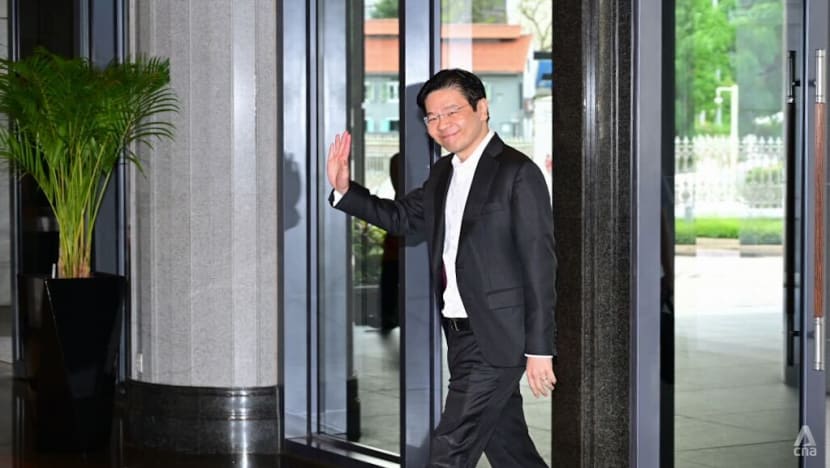Budget 2024: A 'balanced fiscal position' with 'small surplus' of S$800 million expected this year
“The overall stance is appropriate, as we are providing targeted support for households and businesses, even as the economy is projected to operate at around potential,” says Deputy Prime Minister and Finance Minister Lawrence Wong.

Deputy Prime Minister and Finance Minister Lawrence Wong at the Parliament House for the 2024 Singapore Budget on Feb 16, 2024. (Photo: CNA/Gaya Chandramohan)

This audio is generated by an AI tool.
SINGAPORE: A budget surplus of nearly S$800 million, or 0.1 per cent of Singapore's gross domestic product, is expected for financial year 2024, said Deputy Prime Minister and Finance Minister Lawrence Wong on Friday (Feb 16).
Describing this as "a balanced fiscal position", Mr Wong said: “The overall stance is appropriate, as we are providing targeted support for households and businesses, even as the economy is projected to operate at around potential.”
In his annual Budget speech, Mr Wong outlined a range of measures aimed at helping households and businesses tackle near-term cost challenges, as well as longer-term initiatives to address social mobility, lifelong learning, and provide more assurance for families and seniors.
Revenue for 2024 is expected to come in at S$108.6 billion, which is S$4.3 billion or 4.2 per cent more than the previous year’s revised estimates.
This is mainly due to an increase in estimated collections from the Goods and Services Tax, assets taxes, personal income tax and motor vehicle taxes.
At the same time, the government’s expenditure is also set to go up to S$111.8 billion – S$4.9 billion or 4.6 per cent higher than the revised 2023 figure.
When that expenditure is combined with other components, the projected total size of this year's Budget is $131.4 billion, comparable to the S$130.8 billion spent last year.
Social spending continues to make up the biggest part of the annual expenditure, at about S$56.1 billion. This is followed by security and external relations (S$29.1 billion), economic (S$22.4 billion) and government administration (S$4.2 billion).
The net investment returns contribution (NIRC) is expected to bring in about S$23.5 billion in 2024. This will mark a 2.6 per cent or S$0.6 billion increase over the previous year.
Taking into account other components, such as top-ups to the endowment and trust funds, capitalisation of nationally significant infrastructure, and interest costs and loan expenses related to the Significant Infrastructure Government Loan Act (SINGA), the final budget position comes up to a surplus of S$777.51 million.
REVISED POSITION FOR FY2023
The expected FY2024 budget surplus will mark a reversal from a revised deficit of S$3.6 billion, or 0.5 per cent of GDP, in FY2023.
Mr Wong said revenue collections over the past year were “better than expected”, on the back of higher corporate income tax collections.
Corporate income tax is expected to come up to S$28.4 billion, S$4.1 billion or 17 per cent higher than the estimated figures.
Other taxes, such as personal income tax and vehicle quota premiums, also saw better takings due to the stronger-than-expected economic recovery in 2022.
“The additional revenue will allow us to pay for new spending, including the S$7.5 billion injection to the Majulah Package Fund,” said Mr Wong.
However, total expenditure also went up to S$106.9 billion, which is S$2.7 billion or 2.6 per cent higher than previously estimated.
This is due to higher-than-expected spending by various ministries, such as defence, health and transport. Higher operating expenditure came about due to the need to meet priority areas such as catching up of projects deferred by the COVID-19 pandemic, and elevated costs from higher inflation.
“Accounting for both our revenue upside and higher spending, we expect to end FY2023 with a deficit,” said Mr Wong.
FISCAL DISCIPLINE
Mr Wong also reiterated the need to “uphold the ethos of fiscal discipline and responsibility” and ensure the country’s fiscal position “always remains balanced, sound and sustainable.
He pointed to the Finance Ministry’s occasional paper released last year, which laid out projections of Singapore’s medium-term fiscal outlook.
The paper noted that government expenditure is expected to rise to about 19 per cent to 20 per cent of GDP between the financial years of 2026 to 2030, and possibly exceed 20 per cent by the end of the decade.
This remains the government’s assessment, said Mr Wong.
“Assuming we stay within this range of spending increase, we should have sufficient revenues to maintain a balanced budget over the coming years,” he added.
That said, Singapore’s fiscal position remains “tight” in the medium term due to pressures to ramp up spending on various areas such as healthcare and energy transition, he added.
There are also significant policy shifts to strengthen the country’s social safety nets, as part of the Forward SG exercise.
Led by Mr Wong and other fourth-generation political readers, the Forward SG exercise hopes to lay a new roadmap for Singapore with changes spanning education, jobs and support for families and seniors.
“We will spend around S$5 billion on Forward Singapore policy moves in FY2024, and close to S$40 billion in total by the end of this decade,” he said.
Mr Wong warned that the government must manage these expenditures carefully or risk ending up “with a significant funding gap”.
“We already see this happening in many other advanced economies where public finances are on an unsustainable path, and fiscal systems are at risk of breaking,” he said.
“We must never allow this to happen in Singapore.”





















